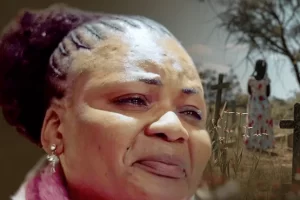Meet Hilder Charity Namujuzi an orphan and proud lesbian who flee Uganda after facing Uganda’s violent homophobia from the anti-gay law. Hilder Charity Namujuzi was 16 when her best friend Dorothy kissed her in the dormitory of the private girls’ school they attended in Kampala, Uganda. The two had grown up together in the city’s Mutundwe district, but Charity had never felt romantically attracted to her or any other woman, before.
Despite her being the only child of a conservative Christian family, Charity had long been taught that same-sex relations violated the laws of Christianity. The kiss overwhelmed her, and her gut told her it was bad. She refused to talk to Dorothy for the next week. In that time, she couldn’t get the kiss out of her head. “I was taken by surprise,” she said.

“But I realized I enjoyed what she did.” Eventually, she went back to Dorothy and told her she wanted to kiss her again. It never occurred to Charity that two women could have a relationship, but she wanted to do what felt good. Because Dorothy was a prefect, she had her own private room. While the other girls spent their Sundays watching movies in the shared dorm, Charity and Dorothy would stay in bed together.
They knew the risk. Homosexuality had been against the law in Uganda since the days of British colonial rule, and it carried a potential 14-year prison sentence. “In Uganda, you grow up knowing being a homosexual is bad. It’s like how you learn being a thief is bad,” Charity narrated. “If you are a homosexual, you are a curse to the world, to the nation.”
For many months, Charity and Dorothy’s relationship deepened, and they talked about finding a place to live together after they graduated. In class, they passed love notes pressed into the pages of textbooks. One day, Charity left a note Dorothy had written her inside a book, and a classmate discovered it that afternoon. “She came and confronted me,” Charity said. “I told her it was just a joke, but she started talking about it and people started making their own conclusions.”
Rumors had already been swirling that Charity and Dorothy were spending time alone in Dorothy’s room, in violation of school rules. So when news of the note reached the dorm’s matron, the school’s administration didn’t hesitate in making a decision: Both were immediately expelled. Charity went back to live with her uncle, her sole guardian since the death of her parents a few years earlier. Dorothy returned to her childhood home nearby. The pair didn’t see each other for days. “Her parents were very strict,” Charity said. “They locked her in the house.” A few days after returning to Mutundwe, Charity heard the drumming of the local community council’s messengers: They were holding a meeting at Dorothy’s parent’s homestead. Curious, Charity disguised herself as a man in a T-shirt and a baseball cap and went to see what it was all about. The council leader announced the reason for the gathering: Dorothy stood accused of having homosexual relations. They did not announce the accuser, but the reason for her expulsion had reached town. The council leader never mentioned Charity by name, but some of the people in attendance began eyeing her. She suspected that some of them could recognize her; it was well known that she and Dorothy were best friends. Sensing danger, she decided to return to her uncle’s house before the meeting concluded.
Hours later, Charity’s uncle reported how the meeting had ended: unfortunately Dorothy was beaten to death a thing that shocked Charity. The council generally punished people with forced labor or, at worst, a caning. She ran over to the family’s yard, but it was too late. She could just make out the shape of Dorothy’s body lying uncovered in the darkness.
Charity’s first thought was to flee for her own safety, but since her parents were dead, she didn’t have anywhere to go. What’s more, her uncle was a wealthy man—a respected member of the community, someone not to be challenged. So long as he didn’t out her to the community council, Charity figured she’d be safe. She tried to keep a low profile while mourning Dorothy, and in time, she began studying at a new high school, graduating four years later. In 2013, she enrolled in one of Kampala’s most prestigious universities to study law. Her uncle paid her tuition, and she moved into a private dormitory near the school.
Soon, Charity began dating a classmate of hers, a girl. It was her first relationship since Dorothy. On Valentine’s Day 2014, Charity’s roommate walked in and discovered the two having sex. The roommate screamed, and with her voice sounding throughout the halls, the entire dormitory came to witness the excitement. The dorm’s caretaker immediately paraded Charity and her girlfriend away as their classmates jeered.
This time, Charity had more reason to worry. Homophobia was at an all-time high in Uganda. Two months earlier, the country’s parliament had passed its notorious Anti-Homosexuality Act, dubbed the “Kill the Gays” bill in the Western media for an early provision that prescribed the death penalty for some people who engaged in gay sex. A slightly modified version of the law eventually passed. It called for seven years in prison for those found guilty of attempting to participate in a same-sex act; actually completing the deed came with a 14-year prison sentence. The law also created the crime of “aggravated homosexuality” for same-sex relations between serial offenders, sexually active HIV-positive people, and others. It carried a potential life prison sentence. The debate over the law, which had been before Uganda’s parliament for nearly five years, brought out some of the most extreme homophobia the region had ever seen. Newspapers published front-page photo spreads of “Uganda’s 200 Top Homos Named.” Attacks ensued, and gay, lesbian, bisexual, and transgender Ugandans increasingly went into hiding.
Like many other LGBT Ugandans, Charity found herself uprooted during these months. That Valentine’s Day, with nowhere else to go, she reluctantly returned to her uncle’s house in the neighborhood where her first love had been murdered. It was the worst decision of her life. By the time she arrived, the owner of the dorm had already called her uncle to tell him she’d been caught having sex with another woman. “When I walked in, he grabbed me by the hand, took me to the room, and tied me to the bed,” Charity said. “He brought some of his friends into the room and told me, ‘Let me see what men can do that women can’t do.’ He said to them, ‘Show her what you can do.’ He locked the men in with me, and they took turns raping me.” Each did “two rounds,” she said. The rape lasted an hour.
Charity’s uncle kept her tied up until the morning. After he finally released her, he ordered her to do housework. She was cleaning when she saw them coming: the same members of the community council who had murdered Dorothy. Charity ran out the back gate and fled by bus straight for Uganda’s border with Kenya, believing nowhere in the country would be safe. At the border crossing at Malaba, she learned that to get to Nairobi, Kenya’s large capital city, would be expensive, and to live there even more so. Charity recalled how, as a child, a Kenyan classmate of hers had mentioned that Kenya accepts people who are chased out of other countries, letting them live in large camps. Along the side of the road, she spotted a food vendor; she lied and told him that she was on her way to visit a friend in one of these camps. Could he direct her?
He asked if she was referring to Kakuma—a large refugee camp in northern Kenya that opened in 1992 to house refugees fleeing Sudan’s civil war, and that has since become home to nearly 200,000 refugees fleeing all manner of strife. The man described how she could get to Kitale, a town in the northern Rift Valley. From there, she could take a bus through Lodwar and on to Kakuma. Charity had no money, so the vendor offered her a job: To earn enough for a bus ticket, she could wash dishes for a few hours. Three days later, Charity arrived at Kakuma, a refugee of Uganda’s violent homophobia.
With the anti-gay fervor growing in Uganda, Charity wasn’t the only one to leave the country. A few weeks later, on March 11, a group of 23 LGBT Ugandans appeared on the front lawn of the United Nations High Commissioner for Refugees’ (UNHCR) office in Nairobi. They wished to register themselves as lesbian, gay, and transgender refugees. Most were in their late teens or 20s, and most were men. They came from all over Uganda—some were working class, others were university educated.
At this juncture, Charity felt a bit secure about her sexual life and Nairobi became her new home homophobia-free compared to her mother land Uganda.
Watch out in our next edition of ‘homosexuality unclothed’ as Charity narrates how she picked on her new life in Kenya.
We will keep you posted




